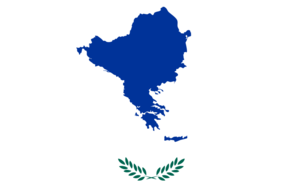Balkan: Difference between revisions
(another universal language) |
(→Lexicography: two words) |
||
| Line 179: | Line 179: | ||
== Lexicography == | == Lexicography == | ||
* {{C|κυβεντ}} | |||
* {{C|βασηλες}} | |||
[[Category:Universal Languages]] | [[Category:Universal Languages]] | ||
Revision as of 04:23, 27 November 2018
This article is a collaborative project, so by all means, jump in! Your help is wanted and appreciated! |
Writing System: Greek alphabet Population: 60 million would be helped by the creation of this language Gender: 3 Alignment: Nominative-Accusative Type: Fusional Word-order: SVO Cases: 3 Language: w:Albanian language, w:Modern Greek, w:Eastern Romance languages, w:South Slavic languages, w:Balkan Romani, w:Balkan Gagauz Turkish, etc.
Anthropology
The term "Balkan" refers to a peninsula, a region, a history, and a sprachbund, all bounded differently and all disagreed upon. Also known as Southeast Europe, linguists have long defined an areal sprachbund here.
There is one vote for each of the following groups
- Albanian
- Greek
- Northern Eastern Romance (consisting of Romanian and Moldovan)
- Southern Eastern Romance (consisting of Aromanian, Megleno-Romanian, and Istro-Romanian)
- Eastern Southern Slavic (consisting of Macedonian, Bulgarian, and Old Church Slavonic)
- Western Southern Slavic (consisting of Slovene, and Serbo-Croatian-Bosnian-Montenegrin), and
- Balkan Romani
Judeo-Spanish, and Gagauz Turkish do not normally get a vote.
Phonology
Unlike a lot of other sprachbünde, the Balkans does not share much common phonology. Hence, a pan-Balkan language is necessarily left only with those elements common to all the source languages. It consists of 16 consonants, 6 vowels, and 3 diphthongs.
Balkan is written in the Greek alphabet, but borrows one letter from Cyrillic. Two sounds are digraphs and two graphemes have two sounds. θ is not "native" and ω indicates schwa.
The writing system is Greek plus Cyrillic be.
Consonants
| Labial | Alveolar | Palatal | Velar | ||
|---|---|---|---|---|---|
| Nasal | /m/ Μ/μ | /n/ Ν/ν | |||
| Plosive | voiceless | /p/ Π/π | /t/ Τ/τ | /k/ Κ/κ | |
| voiced | /b/ Б/б | /d/ Δ/δ | /ɡ/ Γ/γ | ||
| Affricative | voiceless | /t͡s~t͡ʃ~t͡ɕ/ τσ | |||
| voiced | /d͡z~d͡ʒ~d͡ʑ/ δζ | ||||
| Fricative | voiceless | /f/ Φ/φ | /s~ʃ/ Σ/σ/ς | /x~h/ Χ/χ | |
| voiced | /v~ʋ/ Β/β | /z~ʒ/ Ζ/ζ | |||
| Approximant | /r~ɹ/ Ρ/ρ | /j/ Ι/ι | |||
| Lateral | /l~ɫ/ Λ/λ | ||||
Θ/θ is only used in the transcription of foreign words. There are also Ξ/ξ which is /ks/ and Ψ/ψ which is /ps/.
Vowels
The vowels are five cardinals plus schwa, any of which can be stressed. A/α is /a/, Ε/ε is /e/, Η/η is /i/, Ο/ο is /o~ɔ/, Υ/υ is /u/, and Ω/ω is /ǝ/.
Stress
Stress is predictable and right-defined.
Morphology
Balkan nouns and adjectives inflect for 3 genders, 3 cases, and 2 numbers. Gender and case generally flatten in the plural. The cases are Nominative, Accusative, and Oblique. The oblique is governed by a preposition. There is a vocative preposition. The definite article is a postposition. The indefinite article is a preposition, but just a form of the number one.
Pronouns
T-V
| Singular | Plural | ||||
|---|---|---|---|---|---|
| 1 | Nom. | υζ | νη | ||
| Acc. | μει | νας | |||
| Acc. | με | να | |||
| Obl. | μην | νεμ | |||
| Obl. | μη | νε | |||
| 2 | Nom. | τη | βη | ||
| Acc. | τει | βας | |||
| Acc. | τε | βα | |||
| Obl. | την | βαμ | |||
| Obl. | τη | βα | |||
| 3 | Nom. | ατη | ετη | ||
| Acc. | ατω | ||||
| Acc. | |||||
| Obl. | |||||
| Masc. | Fem. | Masc. | Fem. | ||
Syntax
SVO, Relative clauses after, Negations particle, evidential particles

